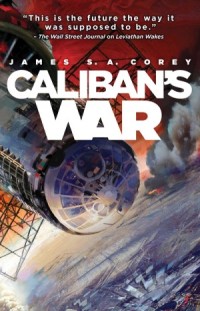Caliban's War by James S.A. Corey
 Wednesday, June 27, 2012 at 11:45AM
Wednesday, June 27, 2012 at 11:45AM 
Published by Orbit on June 26, 2012
Sometimes the second book in a series is a let-down, particularly when it follows a strong initial entry. The good news is that Caliban's War advances the story that Leviathan Wakes began, introduces appealing new characters, adds depth to a familiar character, and reconfirms the authors' ability to tell an energetic, engrossing tale.
Ganymede has been in crisis since Marines from Earth and Mars started shooting at each other. But how did the hostility begin? Only Gunnery Sergeant Bobbie Draper knows the truth: they weren't shooting at each other, but at the monster that was killing them. Since the "monster" could be the protomolecule last seen on Venus in Leviathan Wakes, the Outer Planets Alliance sends James Holden and the crew of the Rocinante to investigate.
Meanwhile, Prax Meng is upset because his daughter Mei was apparently kidnapped during the fighting. Mei has a genetic disorder that puts her at risk of death if she doesn't receive regular treatment. Is there a connection between the snatch and the coincidental timing of the monster's attack? It's up to Holden and his crew to find out.
A third storyline involves Chrisjen Avasarala, an elderly, foul-mouthed UN official whose job is to keep the peace between Earth and Mars, a none-too-easy task. Her story eventually merges with Draper's and becomes one of political intrigue.
I wouldn't recommend reading Caliban's War without first reading Leviathan Wakes. Caliban's War assumes a familiarity with the events that took place in the first novel. While Caliban's War doesn't have quite the same poignant human drama as Leviathan Wakes -- largely due to the absence of Miller, a memorable character who was central to the story in the first novel -- it does replicate the fun factor: engaging characters, low-key humor, and exciting action. Yet there is enough human drama, enough genuine emotion, in Caliban's War to fuel the reader's compulsion to move on to the next chapter ... and the next, and the next.
Many of the characters draw upon familiar stereotypes but that, at least, gives them the benefit of well-defined personalities. In any event, there is a complexity to Holden that rises above the stereotypical. Holden confronts a range of internal conflicts and fears in Caliban's War while proving to himself that he's capable of growth. Holden is an idealist who needs to learn something about pragmatism, but he's also a fundamentally peaceful guy who is morphing into something else after all the horror he's experienced.
Holden is fond of taking his message directly to the people via a futuristic version of the internet. The theme of using direct communication to bypass the government and take control of destiny plays a large part in Caliban's War, just as it did in Leviathan Wakes. That theme is expanded with the addition of Avasarala, who proves to be an adept manipulator of the media.
Caliban's War isn't for science fiction fans who like their novels to reflect world-building or carefully considered technological advances or imagined applications of theoretical physics. Caliban's War is quite the opposite. The writing team known as James S.A. Corey cares more about story-building and character-building than world-building. The result is an absorbing story about memorable characters that some fans will regard as too light-on-science to be taken seriously. Yet not all novels need to be taken seriously; some work on a more elemental, less intellectual level. I don't need to be convinced that "this could really happen" to appreciate the entertainment value of a science fiction novel, but others do, and this might be the right novel for them.
RECOMMENDED
Reader Comments